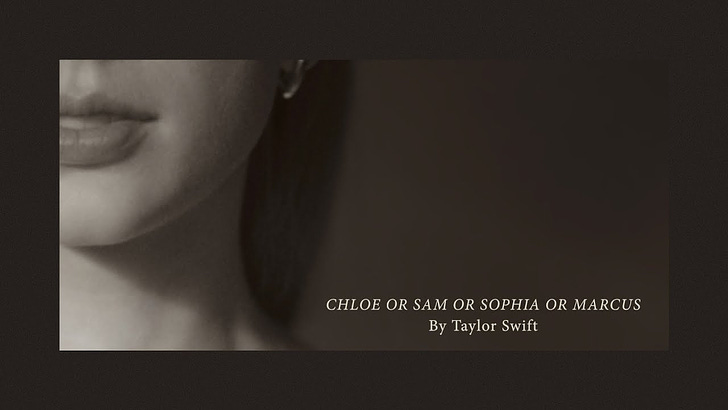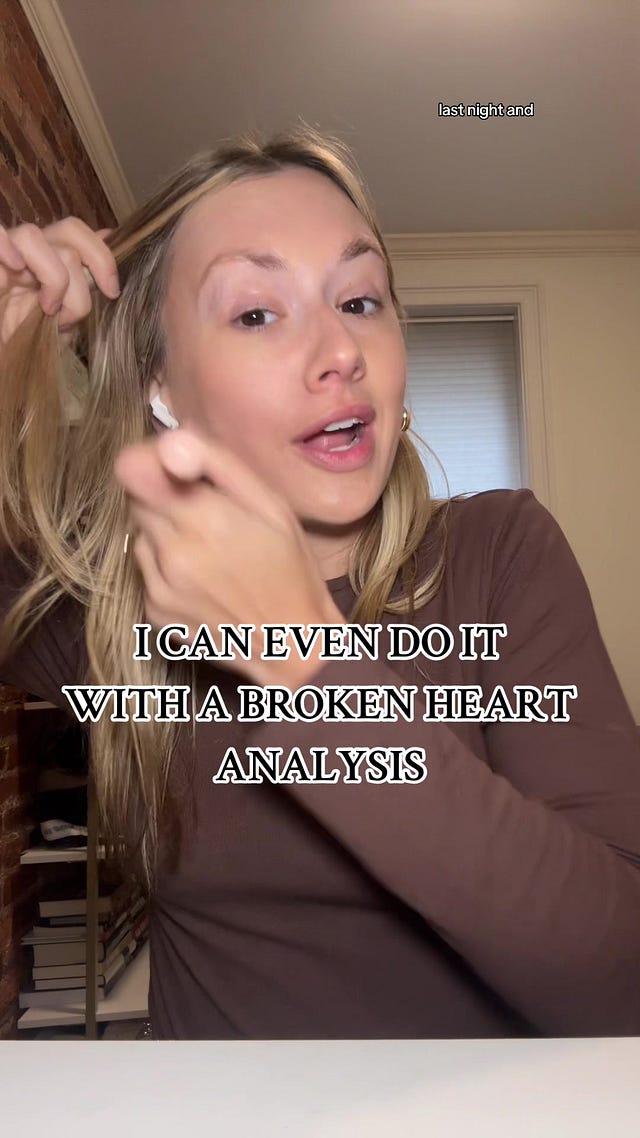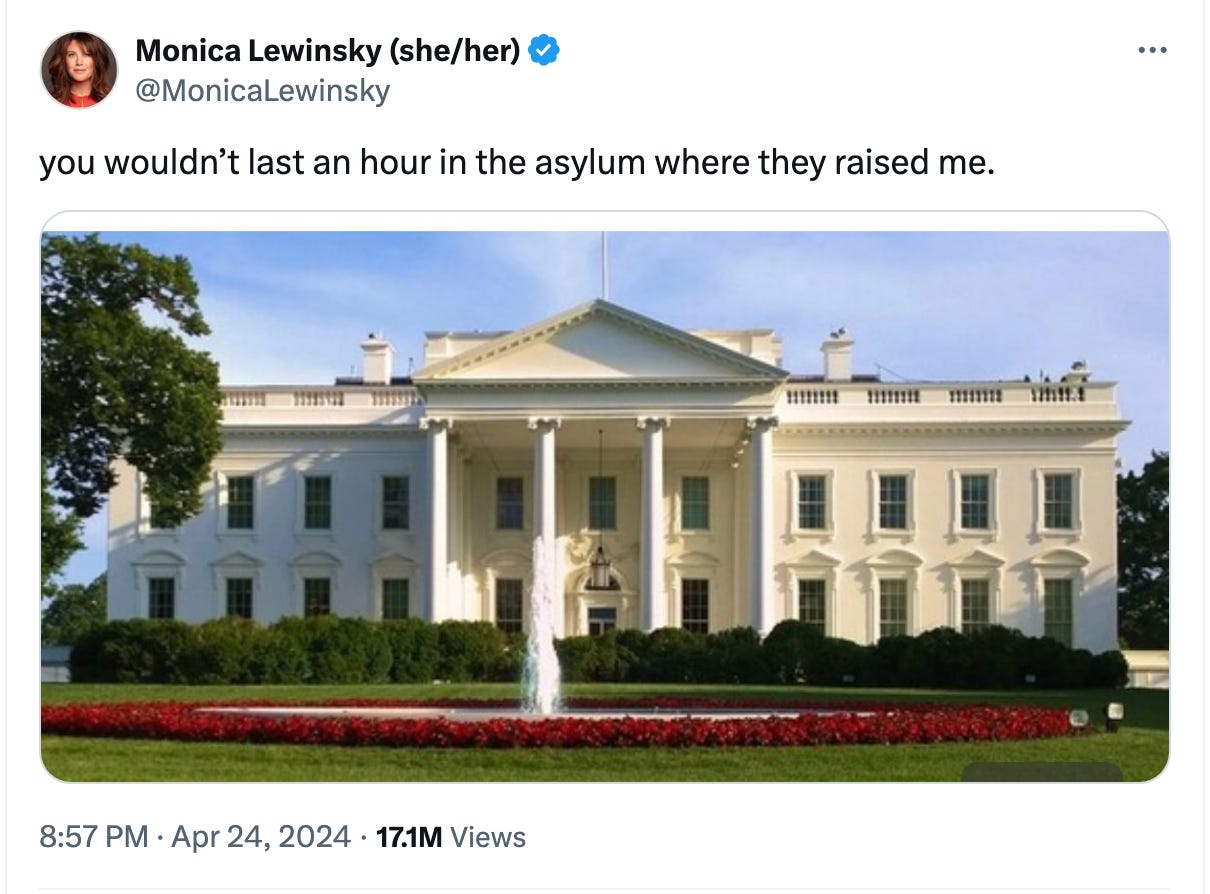When 1989 made Pitchfork’s end-of-2014 list after they didn’t deign to review it, I admit I felt some validation as someone who, after mixed feelings about her earliest singles, had been consistently preaching Taylor’s talent since Fearless, save for the year it took me to come to terms with Speak Now (it was mean!) When Folklore and Evermore were near-universally praised, I thought it took all you long enough. I wavered when this acclaim persisted for Midnights, the mushiness of which I and mostly just I found the most serious aesthetic misstep of her career, and throughout a re-recording program that gave us a great “All Too Well” and consistent profiteering. So it’s something of a relief that tastemakers have turned on her again. Even if you’re listening to someone at a level of sustained global success attained by a countable number of recording artists in history (Bing, Elvis, Beatles, MJ, maybe Madonna or Eminem, Adele if we’re talking pure sales not omnipresence), it’s still easier to root for them when they’re sinned against. Not that a Metascore of 76 doesn’t seem reasonable. The knee-jerk first day kvetching, however, was generally as uninformative as the first day raves from the usual suspects (okay, just Sheffield, love you Rob but c’mon.) Yes, market incentives—plus I bet it ate at her that Drake had the single week streaming record; expect a 100-track Drake mixtape in response—mean it’s too long; 99 percent of double albums are too long, so you were on pretty safe ground with base rates there. But an album that’s, uh-oh, subtle, does take time to sink in.
After five and a half plays, I’m still not sure what grade I’d give the album. It’s not hard to come up with legitimate complaints, like that the production brings nothing new. This is intertwined with the length issue: a big part of what’s allowed her to be so prolific in the 2020s is restricting herself to two producers she knows all too well. I predicted I’d prefer the Dessners to the Antonoffs on average—to the extent that I listened to the bonus tracks first—and I do, though it’s much closer than expected. Damon Krukowski writes informatively on how Antonoff brings in few collaborators (a refreshing change from the old complaints about “this song has twelve co-writers”) and uses his undeniable skill to compress his instrumentation into background vibes. This might be part of his appeal to pop auteurs: on request, he can make himself the smallest producer who ever lived, leaving room for Even More Taylor. But et tu Dessner, who after going to the trouble of trotting in the London Contemporary Orchestra for ten tracks, mixes them way down. One of the few times they’re distinct is “The Bolter”, probably because there’s nothing going on melodically in that one.
“Nothing going on melodically” is an extreme, but in general, this is her least tuneful work. Dave Moore compares Tortured Poets to a Lil Wayne mixtape (except more monetizable, obviously) and her songs to modal rap, with verse tunes mostly rhythmic, anchored to a central note while edging up or down a tone or too. Traditionally, she builds from these into looming prechoruses and huge choruses. The big change this time is that with a few exceptions, the choruses feel like prechoruses. This might’ve been a necessary sacrifice in order to be so prolific: huge choruses are hard; even Max Martin can only come up with so many of them a year. There is some there there: she has sufficient tunage for her hardcore stanbase to work with. Where it might cost her is radio: early SwiftTok fave “I Can Do With a Broken Heart” is my bet for second single (unless it’s “Down Bad”, one of the few with a cutesy Antonoff squiggle-hook this time; I hope not though), but after that, there’s nothing resembling a “Cruel Summer” that can snowball into virality four summers after the fact. Still, with radio playlists changing glacially these days, two singles might suffice, and then we can hold out for a “New Romantics” revival.
Speaking of Romantics, what of “Poetry”? In part, the P-word seems like an apology for not having more within-song narrative. At the album level, there’s an Alwyn-Healy-Kelce progression, but it’s far from linear: Travis mostly shows up on the stupid football song (fittingly stupid? no), and “So Long, London” notwithstanding, Alwyn mostly haunts like a British spectre. In her country eras, her great songs had implied or explicit narrative tension: will he go for short skirts or sneakers? Will Romeo and Juliet have a happy ending? When she made her unmistakeable pop turn with Red, her models were ’70s singer-songwriters from Joni Mitchell to James Taylor, some of whom I like more than others, but all of whom paid careful attention to form and rhyme. Those influences have persisted: “Chloe or Sam or Sophia or Marcus” half-rhymes with “apartment”, “darkness”, and eventually “starlet”. None of this will make you sit up and say “Shit! Did you hear that!” as often as the dozen deffest rappers at any one time can. But it’s, you know, fun. The best comparison I’ve come up with is 2000s Ne-Yo, who wrapped Carly and Paul Simon tricks into contemporary-at-the-time pop sonics in ways that showed no originality and, a few singles aside, no special melodic nous, but nevertheless had music that made the lyrics tickle all the more. Of Year of the Gentleman, Alfred Soto wrote: “His wordplay isn’t particularly clever, but he’s mastered a way of adapting a shopworn phrase so that it illuminates an unpredictable situation—the situations in which all lovers convince themselves that no one else has been in them.”
As you can’t help but know, the narrator’s situation on Tortured Poets really is unique, because she’s Taylor Fucking Swift. This remains both a source of fascination and perhaps the most foundational grievance against her—that she’ll never let you forget this. Like, ever. Me, I appreciate her displays of batshit individuality, like wishing she lived in the 1830s and then not saying anything good about the 1830s. (I imagine she’d have a brief affair with Victor Hugo and we’d get the greatest haterade in music history out of it, plus some real tortured poetry.) Her aforementioned stanbase is showing no sign of burnout, however—conscientious therapists should print out “But Daddy I Love Him” explainers in anticipation—and everyone else is free to find whatever purpose they can in her catchphrases. That “you wouldn’t last an hour in the asylum where they raised me” is already on KnowYourMeme is the perfect illustration: the line is about the ineffability of growing up Taylor, but everyone has a past asylum they can do an image search for. Unless you grew up in a house.
Of course, all her life Taylor’s had bigger advantages than that, and they’ve only accumulated over time. That doesn’t mean the woman hasn’t worked. The thing she’s had to work the most at is her singing: she’s gone from appealing, pitchy ingenue to one of the best singers in pop when she lets Jack let her be. The first verse of “My Boy Only Breaks His Favorite Toys” lets her exercise her lower register without showing it off the way she did on Evermore; she bends the last word of “the voices in his head” back upwards for that extra asylumy feel. Conversely, the opening of “So Long, London” is a farewell to girlish high notes she can still hit in concert but only in moderation. Still, she entrusts to Dessner the two songs where the words matter the most—the meanest ones, which, since I’m much more of a hater than I was in 2010, are my faves. “The Smallest Man Who Ever Lived” makes the fullest use of her two-and-a-half octaves, the low Cs in the chorus signifying tininess, the doubling of her vocals in the second half a threat that she could end you if she so chose. “thanK you aIMee” is even crueler, adapting the country tradition of the intergenerational revenge song and aiming it perfectly, so that the only victim is, as it happens, another billionaire whom you don’t have to feel too bad for.
Beyond those, I don’t know how many songs are going to make it into my long-term memory (plausible candidates are taxonomized below); probably not a majority. Still, it all goes towards padding her lead as the singer-songwriter who’s written the most good songs over the last twenty years, for a pretty wide range of thresholds of “good”. (The most plausible competitor I’ve come up with is Jinx Lennon.) The quantity is part of the appeal: she gives you so much content that you could lose yourself in the Taylorverse. You shouldn’t of course; there’s so much other good music out there. But it’s hard not to stare when she’s always making new windows to look into.
Haters gonna hate: “thanK you aIMee”, “The Smallest Man Who Ever Lived”
Tortured poetry: “So Long, London”, “I Hate It Here”
Untortured poetry: “So High School”, “Clara Bow”
Moderately disconcerted poetry: “Chloe or Sam or Sophia or Marcus”, “Peter”
Well sung: “My Boy Only Breaks His Favorite Toys”
Hit potential: “I Can Do It With a Broken Heart”, “Fortnight”
Won’t be a hit but deserves to be: “Guilty as Sin?”






Day-um! Lay it DOWN! Jinx for lagniappe, even! You ain't no tire-kicker in this land...